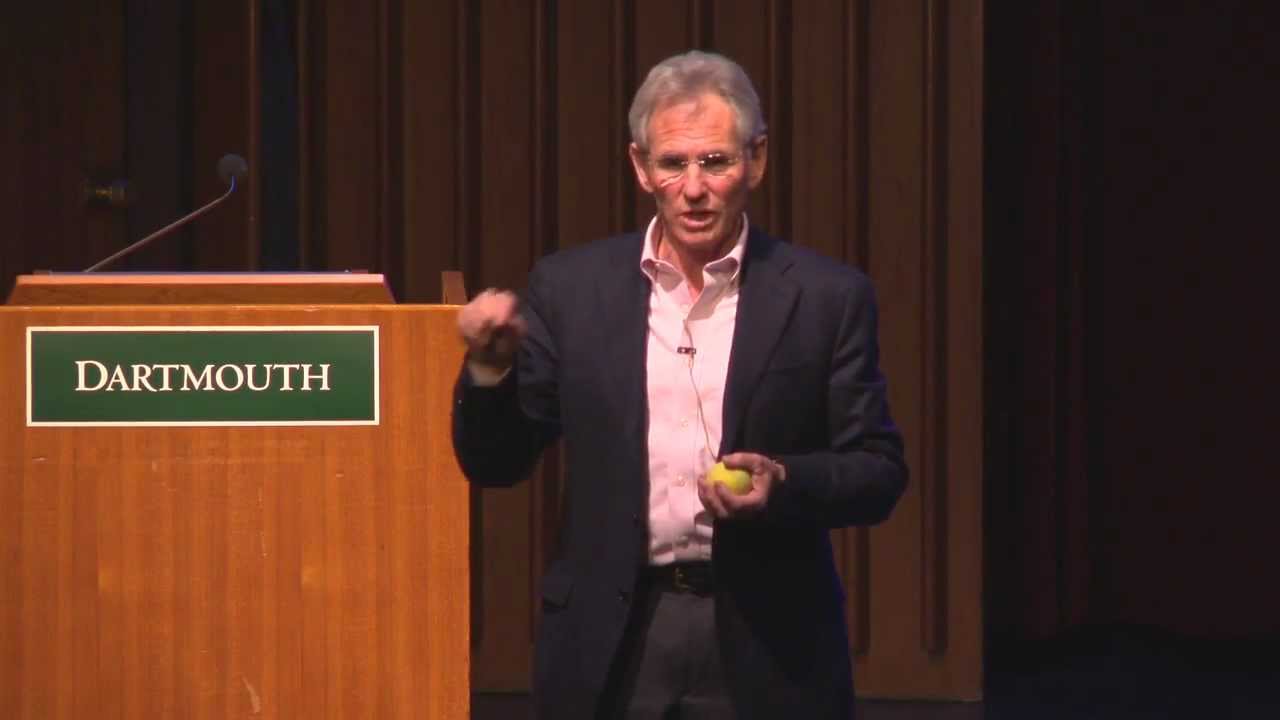Dartmouth
The Tucker Foundation and Dartmouth Hitchcock Medical Center
present
Jon Kabat-Zinn
“The Healing Power of Mindfulness”
April 7, 2011
Spaulding Auditorium
Dartmouth College
Stay Connected to Dartmouth on:
Facebook – http://www.facebook.com/Dartmouth
Twitter – http://www.twitter.com/Dartmouth
Flickr – http://www.flickr.com/Dartmouthflickr
Google + – http://plus.google.com/+Dartmouth
Instagram – http://instagram.com/DartmouthCollege
Source




Good talk….whoever was running the lights…should be fired.
Jon Kabat-Zinn changed my life. I read "Full Catastrophe Living" many years ago but back then I was in my early thirties and really hadn't lived. Now that I'm 60 and have experienced pain and loss and am living with a job that is stressful to the max, I decided to reread the book and it was mind-blowing. I felt he understood every bit of what I have been going through. Just feeling understood was a big thing, but the practices he outlines are incredibly helpful. I urge everyone to read this book.
Mindfulness Practice Course is the best thing my psychiatrist recommended me to attend. It changed my life.
Seems like everyone in the room has a cough during the meditation part of this video..
https://m.youtube.com/channel/UCyNLXkwjzIfhJRvo7C2g8qA
HUMAN RIGHTS VIOLATIONS
TRALEE COUNTY KERRY IRELAND
third video with Kabat-Zinn I am watching spanning 2011-2019; in all of them he starts with "come out this afternoon…you have better things to do….etc."…..
Social justice is extremely injustice for white people in general and white men in particular.
just love how he makes mindfulness not sound like some esoteric BS, it's just a state the human mind should operate in
40:10 He goes to meditate and I keep on looking at the youtube watch to make sure video is running. Lol! May be I WAS waiting for something else to happen.
WOE UNTO INHABITANTS OF EARTH 👺🔥🤟
Why is video almost 2 hours? Just get to the point
good way to end it, talking truth
To the subtitler – thank you for your work, it's mostly good, but at 1.19.04 it's Thich Nhat Hanh. All the best.
Rhys Davids in 1881 coined the word “mindfulness” from the original seminal text in the Buddhist teachings, the Satipaṭṭhāna Sutta.
Rhys Davids translated “Sati” from the Buddhist context “present-moment awareness” to “mindfulness”. I do not find any literature why Rhys Davis chose “mindfulness”. As “mindfulness” is not an accurate translation of “Sati”.
The use of Buddhist practices "Anapana Sati" (2600 years-old) and coined “mindfulness therapy” practices in the context of Western clinical psychotherapy emerged in early 1990s. It was initially associated Jon Kabat-Zinn, PhD who borrowed the word “mindfulness” from Rhys Davids and introduced “mindfulness therapy” in his work at the Stress Reduction Clinic and Center for Mindfulness in Medicine, Health Care, and Society at the University of Massachusetts.
Jon Kabat-Zinn, PhD “mindfulness- based stress reduction’ (MBSR) was later expanded into behavioral medicine (aka Health Psychology, + PsychoNeuroImmunology); and then later in turn fostered into the development of ‘mindfulness- based cognitive therapy’ (MBCT). Western medicine, Western clinical psychology, NeuroPsychology, and Neuroscience put the Eastern Wisdoms/Practices/ and Traditions including the specific Buddhist teachings & practices to the scientific rigor in thousands of clinical studies. Western medicine/Western Psychology owes everything to the Eastern Traditions/practices, but does not ever give credit to the Eastern Traditions/Wisdoms/Practices that are 6000-years-old.
“Mindfulness” is a dual state of consciousness. There is the Observer and the observed. The Seer and the seen. The Watcher watching. The Projector and projection. The mind using itself to understand itself. Mindfulness is Doing. Mindfulness is Yang energy. Mindfulness is active.
Moreover, “mindfulness” implies the mind is full. This is not what we are practicing when we are “present to the moment” and simply “Being present to What is”. “Sati” is YIN energy. Sati is restful. Sati is healing. Sati is presence. Sati is nourishing to the mind + body + soul.
When we are practicing “Sati”, it is non-dual—It is simply “present moment awareness”. There is acceptance (YIN) to what ever presents in the internal environment (interoception) mind (thoughts), body (e.g. emotions/feelings), and outward environment (exteroception), and a letting go, Surrender, and just a Flow of BEING present to ‘What Is’ at this moment.
You don’t have to be a Buddhist to practice Mindfulness, but if you are a Buddhist you practice Mindfulness.
You don’t have to be a Buddhist to practice Sati, but if you are a Buddhist you practice Sati
The Four Foundations of “Mindfulness” or “SATI”
• Present moment awareness of your experiences internally (interoception), externally (exteroception), and both.
• Acceptance to the nature of impermanence: the arising, the passing away, and both the arising and passing away in regard to your experience.
• Awareness of what is unfolding moment to moment—without mental commentary— and to remain present and spacious of What IS…the Isness of this moment.
• Calm abiding without clinging to anything that enters your realm of experience.
Both Mindfulness and Sati are awareness to the feelings and sensations of these experiences. We meet ourselves for the first time completely and fully. We make friends with ourselves. We make friends with our emotions. We realize who I am, what I am, and what the world is in relation to “I”. We realize lovingly and gently that we are the creator of our emotions from our thought patterns.
In our Western culture, we are programed by our society to always be DOING (YANG), and we know little to nothing about BEING (YIN).
For example, awareness of the inhale and exhale of your breath is one way to concentrate on the present moment SATI. Check out my published scientific articles: Conscious Breathing, and How the brain changes and improves with Mindfulness and Meditation, and Transforming difficult emotions, and Understanding Emotions , and Meditation guidelines. website: SpaciousTherapy.com
Both Mindfulness and Sati involve allowing your thoughts and feelings to pass without either clinging to them, identifying with them, or avoiding them.
If you just allow thoughts and emotions take their natural course, they naturally dissolve. While practicing “mindfulness” practicing “Sati”, you may become distracted by your thoughts and that is okay. The process is about witnessing your thoughts/feelings and then re-directing your awareness to breath. While practicing Sati we are present to the moment and anchor to the breath.
Shawna Freshwater, PhD Licensed Clinical Psychologist, + PhD NeuroPsychologist, and Medical Diploma in Behavioral Neurology
We should all bow down to this man and he doesn't get the credit he deserves anymore because the next generation have basically stolen all his work and now call it their own because they can add an fMRI test or they have some sort of Swami standing next to them. He did the hard and brave work. He's not the best speaker but don't discount him because not everything is about the entertainment value. This is a man with real heart and real ability. In the early days he was in the room with the patients helping them physically get into postures and using his healing touch to encourage them. There was no fMRI "test" for "proof" — he learned from his patients. I bow down to him and I wish all the next generation in his field would acknowledge him. One of the next generation referred to his work as a "good adjunct" to his own. What gall, he was doing the exact same work but with an fMRI and a Swami on the platform. End of rant, but this is a man worth deep respect and there are few of them on this planet.
39:24 – The comment about ancient indians maybe false because I've been born and brought up in India for 25 years now. I know many people who practice yoga. I know much about Hindu mythology too. But never heard this statement.
That's nice! I also like meditation. 💚🙏
For my mindfulness meditating I've been watching lots of Sri Avinash recently.
I find Sri Avinash's peace talks very heartwarming and helpful for my life. 💚
It is so difficult to be ok in the worst moments! I try one moment i improve others i fail but i can through these moments atleast at times stop mid moment then before then after it give myself a break. Start again. This has freed my mind to enjoy almost even laugh at myself and love it. All my thoughts not my driving force into some frustrated moment. Thank you so much
Not only is mindfullness a comple fad, it is also very damaging to a persons mind. It inhibits their ability to seperate real memories from false memories. Maharishi Mahesh Yogi and Mingyur Rinpoche are the meditation guru. Not this Jon quack. Mindfullness is damging to the mind.
video is too queit
The mind has a mind of its own.
What a gift.
If you want to read more about Elizabeth Blackburn on the TELOMERE EFFECT that Zin talks about, here is a great article from The Guardian: https://www.theguardian.com/science/2017/jan/29/telomere-effect-elizabeth-blackburn-nobel-prize-medicine-chromosomes
i love this guy
so meditation isnt possible when your homeless or cant pay the bills er .. so its ok if your Harvard graduate or do meditate on all the crap you didnt or did do ..
blue all i can see is black the black of human desire .
the last reformation …the movie about Jesus healing
teue instantally healing only in Jesus name, all others thing aren't professionals…are only a experiment…If Jesus is a fake , you have to meet his healing power and try him before you tell this
Introduction far too long and not required. Far better to listen to the man 🙂
Thank you for the upload. I did a research paper on burnout of ICU nurses and lots of the research mentioned the MBSR.
'you showed up'…. wonderful talk, thank you!
How wonderful to be able to listen to speakers like Jon Kabat Zinn while sitting in the comfort of my own home and to receive such valuable information at no cost. Thank you very much for all your work and sharing.
"Imagine of the Congress were Mindful…."
great meditation but I don't like the advertisement after the first ten minutes it completely disrupts my feeling of relaxation.
I like Jon Kabat Zin but I find he uses too many words to make a point. After a few words I'm hanging for his goal, theory, mindfulness.
Your father-in-law was a major influence on me at Bu 1966-70 and after. We stayed in touch until he died. not close but even when I was in depression on a Fulbright in India, he told me a story about Roz getting sick and he canceled his gig in Ca. and if the sponsor was really your friend, they'd understand. The Fulbright Sponsor wasn't my friend and I slogged it through the 4 months. Tap dancing can be joyful (my project-to research tap and Indian classical kathak) , but it can also be a drag if not enough structure.
scientist. I meant. sorry.thanks
Please: what´s the name of that German scentist.Icoukdn´t grasp it. thanks
Even if there is no intention of practicing any of this, it's good to be reminded that much of what we think about, fear, dread, or ponder we can do nothing about. The past and future are things of which we have no control. How settling it is that the only thing we have is now.
Nice Shirt 😉
"You don't need to find special. This is good enough"
damn he is wordy
nice! 500 days!
Jon Kabat- Zinn is just a remarkable person. So genuine and sincere and caring. Not like so many sheisters looking for a quick buck.
12:30 is a great thought
Shame about the terrible lack of volume. I'm reluctantly having to abandon it almost mid way through because it's so difficult to hear him even though have my volume at max. Usually my max volume point is deafeningly loud but on this occasion I cannot hear this video. Hopefully I will find equally helpful videos on mindfulness elsewhere on YouTube. So disappointed by this.
Fine (F'ed up, insane, neurotic, and emotional) While in the elevator an answer!
Namaste'
I found this very helpful and interesting … thank you